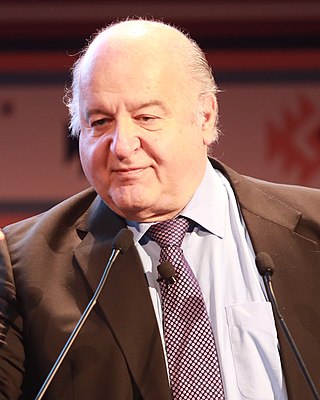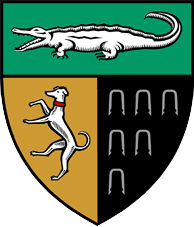External links
- "Yale Law School" (PDF). law.yale.edu. Archived from the original (PDF) on 11 February 2017. Retrieved 2022-02-25.
Robert Ellickson | |
|---|---|
| Nationality | American |
| Alma mater | Oberlin College Yale Law School |
| Scientific career | |
| Fields | Property law |
| Institutions | Yale Law School |
Robert C. Ellickson is an American property law scholar. He is the Walter E. Meyer Professor of Property and Urban Law at Yale Law School, and was formerly on the faculty at the USC Gould School of Law and Stanford Law School. [1] He is a fellow of the American Academy of Arts and Sciences and a past president of the American Law and Economics Association. Ellickson is the author of numerous books and articles on land use, property, and social norms, and is best known for his 1991 book Order Without Law: How Neighbors Settle Disputes. In that book, a study of ranchers and farmers in Shasta County, California, he argues that, contrary to the Coase theorem, neighbors in close-knit societies reach efficient outcomes in land and property use not by bargaining around legal rules but by largely ignoring them in favor of informal social norms. In 2008, Ellickson was awarded the Brigham–Kanner Property Rights Prize by the College of William & Mary School of Law for his body of work advancing the cause of private property rights. [2]

Hernando de Soto Polar is a Peruvian economist known for his work on the informal economy and on the importance of business and property rights. His work on the developing world has earned him praise worldwide by numerous heads of state, particularly for his publication The Mystery of Capital and The Other Path. He is the current president of the Institute for Liberty and Democracy (ILD), a think tank devoted to promoting economic development in developing countries located in Lima, Peru.

Richard Allen Epstein is an American legal scholar known for his writings on torts, contracts, property rights, law and economics, classical liberalism, and libertarianism. He is the Laurence A. Tisch Professor of Law at New York University and the director of the Classical Liberal Institute. He also serves as the Peter and Kirsten Bedford Senior Fellow at the Hoover Institution and as a senior lecturer and the James Parker Hall Distinguished Service Professor of Law Emeritus at the University of Chicago.

Yale Law School (YLS) is the law school of Yale University, a private research university in New Haven, Connecticut. Established in 1824, it has been ranked the number one law school in the country by U.S. News & World Report every year since the magazine started publishing law school rankings. The 2020–21 acceptance rate was 4%, the lowest of any law school in the United States. Its yield rate of 87% is also consistently the highest of any law school in the United States. The school’s small size and prestige have made its admissions process the most selective of any law school in the United States.

Vanderbilt University Law School is the law school of Vanderbilt University. Established in 1874, it is one of the oldest law schools in the southern United States. Vanderbilt Law enrolls approximately 640 students, with each entering Juris Doctor class consisting of approximately 175 students.

Frank Isaac Michelman is an American legal scholar and the Robert Walmsley University Professor Emeritus at Harvard Law School.
Thomas W. Merrill is an American legal scholar who is the Charles Evans Hughes professor at Columbia Law School. He has also taught at Yale Law School and Northwestern University School of Law.
James E. Krier is the Earl Warren DeLano Professor Emeritus of Law at the University of Michigan Law School. His teaching and research interests are primarily in the fields of property, contracts, and law and economics, and he teaches or has taught courses on contracts, property, trusts and estates, behavioral law and economics, and pollution policy.

William & Mary Law School, formally the Marshall-Wythe School of Law, is the law school of the College of William & Mary, a public research university in Williamsburg, Virginia. It is the oldest extant law school in the United States, having been founded in 1779 at the urging of alumnus Thomas Jefferson. As of 2023, it has an enrollment of 606 full-time students seeking a Juris Doctor (J.D.) or a Master of Laws (LL.M.) in the American legal system, a two or three semester program for lawyers trained outside the United States.
The Brigham–Kanner Property Rights Conference was organized in 2003 at the Marshall-Wythe School of Law at the College of William & Mary, with the first conference held in October 2004. The Conference and Prize were proposed in 2003 by Joseph T. Waldo, a graduate of the Marshall–Wythe School of Law with the support of the then dean of the law school, W. Taylor Reveley III who would later become president of the college.
The Brigham–Kanner Property Rights Prize is awarded each Fall by the William & Mary Law School, at the Brigham–Kanner Property Rights Conference. The Conference and Prize were proposed in 2003 by Joseph T. Waldo, a graduate of the Marshall–Wythe School of Law with the support of the then Dean of the Law School, W. Taylor Reveley III, who would later become president of the college. The Conference and Prize were inaugurated in 2004. The Conference and Prize are named after Toby Prince Brigham and Gideon Kanner for "their contributions to private property rights, their efforts to advance the constitutional protection of property, and their accomplishments in preserving the important role that private property plays in protecting individual and civil rights." Toby Prince Brigham is a founding partner of Brigham Moore in Florida. Gideon Kanner is professor of law emeritus at the Loyola Law School in Los Angeles. The Brigham–Kanner Prize is awarded annually during the Brigham–Kanner Property Rights Conference.
James W. Ely Jr. is an American historian and legal scholar who serves as the Milton R. Underwood Professor of Law Emeritus and Professor of History Emeritus at Vanderbilt University. He received his Ph.D. in history from the University of Virginia and his L.L.B. from Harvard University. Ely is a property rights expert, a legal historian, and an author and editor of several books that have received critical acclaim from legal scholars and historians.
Vicki L. Been is an American lawyer, public servant, and professor who served as the Deputy Mayor of New York City for Housing and Economic Development from April 2019 to December 2021. She previously served as commissioner of the New York City Department of Housing Preservation and Development. She is a law professor at the New York University School of Law and has served as director of the Furman Center for Real Estate and Urban Policy.
David Lee Callies is the Benjamin A. Kudo Professor of Law at the William S. Richardson School of Law at the University of Hawaiʻi at Mānoa. His focus is on the topics of land use, real property, and state and local government. In 2015 he was honored with the Owners' Counsel of America's Crystal Eagle Award for his lifetime of scholarship about land use, eminent domain, and regulatory takings.
Carol M. Rose is the Ashby Lohse Chair in Water and Natural Resources at the University of Arizona James E. Rogers College of Law and was previously the Gordon Bradford Tweedy Professor of Law and Organization at Yale Law School.
Michael M. Berger is an eminent domain and land use lawyer at the firm of Manatt, Phelps & Phillips. His practice focuses on eminent domain, inverse condemnation, due process, and equal protection. Berger received his undergraduate degree at Brandeis University. He received his J.D. from Washington University School of Law and his LL.M. in real property from the University of Southern California. He has argued before the Supreme Court as well as state Supreme Courts and Federal Appellate Courts. Notable cases he has argued before the US Supreme Court include Tahoe-Sierra Preservation Council, Inc. v. Tahoe Regional Planning Agency, City of Monterey v. Del Monte Dunes at Monterey, Ltd., Preseault v. United States, and First English Evangelical Lutheran Church v. Los Angeles County.
Joseph William Singer is an American legal scholar specializing in property law. He is the Bussey Professor of Law at Harvard University, where he has been teaching since 1992. Previously, he taught at Boston University School of Law and practiced law in Boston. He also served as a law clerk in the Supreme Court of New Jersey.
Eric T. Freyfogle is a research professor at the University of Illinois College of Law and Swanlund Chair Emeritus at the University of Illinois at Urbana-Champaign. He is a well- known writer and lecturer on nature and culture, on environmental and natural-resource challenges, and on private property considered as a dynamic, socially constructed institution. He has long been active in state and national conservation causes, including service on the Boards of Directors of the National Wildlife Federation and the Illinois-based Prairie Rivers Network.
Steven J. Eagle is Professor of Law Emeritus at George Mason University's Antonin Scalia Law School, where he teaches Constitutional Law, Land Use Planning, and Property amongst other subjects, and was formerly a professor of law at George Washington University Law School, Vanderbilt University, the University of Toledo College of Law, and Pace University Law School. Eagle graduated from the City College of New York with a B.A. (1965) and received a J.D. from the Yale Law School (1970).
Toby Prince Brigham was an American lawyer and scholar in the fields of property rights and eminent domain. In addition to his law practice, Brigham involved himself with organizations and events aimed at educating and informing attorneys and legal scholars about property rights law, and the constitutional rights associated with property ownership.